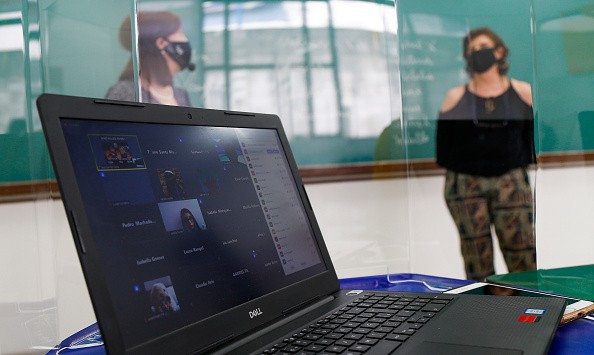Nowadays, it is hard to tell if a student is cheating during an exam since classes are already conducted online because of the ongoing global pandemic. To help the professors properly monitor their students, an "anti-cheating" software was developed.

SAO PAULO, BRAZIL - OCTOBER 02: Teachers in an empty classroom conduct an online class at Santa Maria school amidst the coronavirus (COVID - 19) pandemic on October 2, 2020 in Sao Paulo, Brazil. The school classroom is ready with protection measures and safety distance among tables waiting for students to return.
Also Read: AI Robot "Curly" Beats the Korean Olympic Silver-Medalist Curling Team
However, can the schools trust this new artificial intelligence? ProctorU, the proctoring exam program, already accused a college student of cheating during an exam. The student, under the username DaynuhJoe, posted her reaction on TikTok.
The AI flagged some of her behavior during an exam as suspicious. Because of ProctorU's report, her professor decided to give her a zero on the assessment.
"So, just to let you know how online school and college is going, I just took an exam that I studied really, really hard for, and I got a B on it. And it's a pretty difficult exam, so a B is pretty good," she said.
"And my professor is giving me a zero, because the Review+ said I was talking when I was just, like, re-reading the question so I could better understand it," she added.
The video went viral in less than a week, receiving 3 million views. Viewers supported the girl in the commenting section and condemned the professor for his action.
One of the TikTok users said that he is so sorry that the student had to deal with the situation. Even Alonzo Lerone, a popular YouTuber and comedian, also commented on the video, asking her professor's name because he wants to talk to the teacher.
DaynuhJoe is not the only student affected by the new technology
The proctoring software is also causing problems for other students because of the skin color. Another student named Alivardi Khan said that the ExamSoft, a monitoring tool used during the Bar exam, can't recognize him because of low lighting.

UNLV students, including senior Nick Ferrari (C), attend Jury Decision Making, a criminal justice class taught by UNLV Department of Criminal Justice chairman and professor Dr. Joel Lieberman, at UNLV amid the spread of the coronavirus (COVID-19) on September 9, 2020 in Las Vegas, Nevada. Although it is an in-person class, Lieberman allowed the students to choose how they would attend, in person or online, with the choice almost evenly split between the two. To lower the number of people on campus to allow for social distancing because of the pandemic, the university moved fall 2020 courses with more than 50 students, about 80 percent of its classes, to remote instruction, with 20 percent of courses held in-person or hybrid.
However, he said that he is inside a well-lit room. He even posted a photo of his room on Twitter to show that the lightings were fine. The student said that he is pretty sure that all of the students already predicted that the software wouldn't work for people of color.
Ok @ExamSoft support told me to “sit directly in front of a lighting source such as a lamp.” I’m receiving the same issue preventing me from completing the NY UBE mock exam. Facial recognition technology is racist. @DiplomaPriv4All do y’all think I have “adequate lighting”? pic.twitter.com/7tFdwfpyHB — Alivardi Khan (@uhreeb) September 11, 2020
This kind of technology has already faced criticism because it misidentifies people of color. The National Institute of Standards and Technology (NIST) conducted a study in 2019 and discovered that facial recognition technology usually misidentifies Asian and African-American faces.
For more news updates about new artificial intelligence, always keep your tabs open here at TechTimes.
Also Read: Ripjar Wants to Develop an AI That Detects Financial Crime; Here's How Labyrinth Works
This article is owned by TechTimes,
Written by: Giuliano de Leon.









